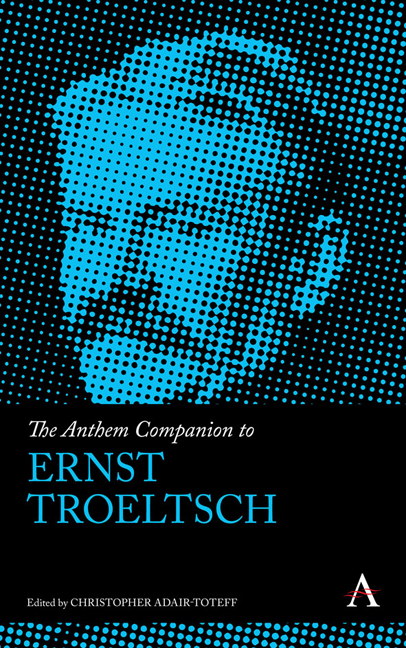Book contents
- Frontmatter
- Contents
- Introduction Ernst Troeltsch: Theologian, Sociologist, Philosopher, and Culture Critic
- Chapter One The Independence of Religious Phenomena: The Work of Ernst Troeltsch as a Template for the Study of Religion
- Chapter Two Troeltsch on Protestantism and Modernity
- Chapter Three Church, Sect, Mysticism: Writing the History of Christianity
- Chapter Four Troeltsch's Personalism
- Chapter Five Performative Practice: Ernst Troeltsch's Concept(s) of Christianity
- Chapter Six Troeltsch and the Problem of Theological Normativity
- Chapter Seven Troeltsch as Dogmatic Theologian
- Chapter Eight Ernst Troeltsch and the Problem of Historicism
- List of Contributors
- Index
Chapter Two - Troeltsch on Protestantism and Modernity
Published online by Cambridge University Press: 10 May 2018
- Frontmatter
- Contents
- Introduction Ernst Troeltsch: Theologian, Sociologist, Philosopher, and Culture Critic
- Chapter One The Independence of Religious Phenomena: The Work of Ernst Troeltsch as a Template for the Study of Religion
- Chapter Two Troeltsch on Protestantism and Modernity
- Chapter Three Church, Sect, Mysticism: Writing the History of Christianity
- Chapter Four Troeltsch's Personalism
- Chapter Five Performative Practice: Ernst Troeltsch's Concept(s) of Christianity
- Chapter Six Troeltsch and the Problem of Theological Normativity
- Chapter Seven Troeltsch as Dogmatic Theologian
- Chapter Eight Ernst Troeltsch and the Problem of Historicism
- List of Contributors
- Index
Summary
During his years as a professor in Heidelberg (1894– 1914), Ernst Troeltsch engaged himself intensively with historical studies of the relation between Protestantism and the origins of the modern world. These writings provide a rich and multi- faceted picture of Troeltsch's theory of modernity, and demonstrate Troeltsch's unique way of exploring and analyzing the role of religion in it. Like many other intellectuals in Heidelberg in the early 1900s, Troeltsch used interdisciplinary and historical research to illuminate questions about the modernization of society and to explore possible responses to the perceived crises of modernity resulting from rapid social change. Troeltsch and his colleagues in the Eranos- Kreis regularly discussed various forms of political, economic, and social modernization and were particularly interested in religion as a force capable of shaping culture and of generating values and norms to guide the present and the future.
From the early years of his scholarly production, Troeltsch's historical studies of Christianity and of Protestantism revised and challenged widespread scholarly consensus about the study of theology and church history in Germany. Especially among Lutheran church historians, these disciplines directed the study of history toward the explication (and in some sense the legitimation) of the dogmatic assertions of the (Protestant, institutional) church. Troeltsch rejected this approach from the beginning. In his dissertation, Troeltsch's study of Lutheran reformer Philip Melanchthon (and scholastic theologian Johann Gerhard) became the occasion for working out a new method that placed theology in its societal contexts instead of focusing in an insular way on the history of ideas or doctrines (apart from their profound intertwinement with social, political, economic, and cultural forces). Troeltsch explored the institutional conditions that informed Melanchthon's interpretation of natural law and showed how Melanchthon's theological and legal categories reinforced the political and social order of the Protestant territories. Troeltsch's method thus had a relativizing effect on the interpretation of church history and questioned the dominant view of Protestantism as the foundation of the modern world. Far from initiating or even embracing a protomodern culture of individual freedom, the Protestant Reformers (in Troeltsch's view) carried forward the medieval model of a theological and political unity of culture, and were thoroughly a product of the late Middle Ages and not the bearers of the modern world.
- Type
- Chapter
- Information
- The Anthem Companion to Ernst Troeltsch , pp. 37 - 54Publisher: Anthem PressPrint publication year: 2017



